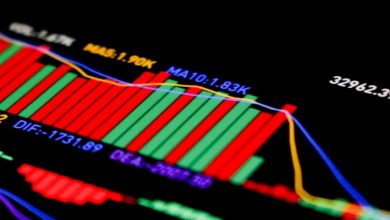The Role of Decentralized Exchanges in the Crypto Market

- Understanding Decentralized Exchanges
- Advantages of Decentralized Exchanges
- Challenges Faced by Decentralized Exchanges
- Regulatory Environment for Decentralized Exchanges
- The Future of Decentralized Exchanges
- Comparison between Centralized and Decentralized Exchanges
Understanding Decentralized Exchanges
Decentralized exchanges (DEXs) are platforms that allow users to trade cryptocurrencies directly with one another without the need for a central authority to facilitate the transactions. This peer-to-peer model offers several advantages over traditional centralized exchanges, including increased security, privacy, and control over funds.
One of the key benefits of decentralized exchanges is that they eliminate the need for users to trust a third party with their funds. Instead, trades are executed using smart contracts, which are self-executing agreements stored on a blockchain. This means that users retain control of their private keys and assets throughout the trading process, reducing the risk of hacks or theft.
Another advantage of DEXs is the privacy they offer. Because trades are conducted directly between users, there is no need to create an account or provide personal information to a central exchange. This anonymity can be appealing to those who value their privacy and want to keep their trading activities confidential.
Additionally, decentralized exchanges are often more resistant to censorship and regulatory interference. Since there is no central point of control, it is much harder for governments or other authorities to shut down or regulate DEXs. This can be especially important for users in countries with strict regulations on cryptocurrency trading.
Overall, decentralized exchanges play a crucial role in the crypto market by providing a secure, private, and censorship-resistant way for users to trade digital assets. As the popularity of cryptocurrencies continues to grow, DEXs are likely to become an increasingly important part of the ecosystem, offering a viable alternative to centralized exchanges for those who value security and privacy.
Advantages of Decentralized Exchanges
Decentralized exchanges offer several advantages that make them an attractive option for traders in the crypto market. One of the key benefits is **increased** security. Unlike centralized exchanges, decentralized platforms do not hold users’ funds, reducing the risk of hacks and theft. This gives traders more control over their assets and **helps** protect them from potential security breaches.
Another advantage of decentralized exchanges is **enhanced** privacy. Users do not need to go through a lengthy verification process to start trading, as they retain control of their private keys. This anonymity can be appealing to those who prioritize privacy and want to keep their trading activities confidential.
Decentralized exchanges also **offer** greater transparency compared to their centralized counterparts. All transactions are recorded on the blockchain, making it easy for users to verify trades and track their funds. This level of transparency **helps** build trust among traders and reduces the risk of fraudulent activities.
Furthermore, decentralized exchanges are **resistant** to censorship. Since they are not controlled by a single entity, there is no central point of failure that can be targeted by regulators or governments. This **ensures** that trading can continue uninterrupted, even in regions where crypto regulations are strict.
In conclusion, decentralized exchanges provide a secure, private, transparent, and censorship-resistant trading environment for users in the crypto market. These advantages make them a popular choice for traders looking to take full control of their assets and trade with peace of mind.
Challenges Faced by Decentralized Exchanges
Decentralized exchanges play a crucial role in the crypto market, offering users a secure and transparent way to trade digital assets. However, they also face several challenges that can impact their effectiveness and adoption.
- 1. **Liquidity**: One of the main challenges faced by decentralized exchanges is the lack of liquidity. This can result in low trading volumes and wide spreads, making it less attractive for traders to use these platforms.
- 2. **Security**: Another significant challenge is security. Decentralized exchanges are vulnerable to hacking and other cyber threats, putting users’ funds at risk. Ensuring robust security measures is essential to build trust among users.
- 3. **User Experience**: Many decentralized exchanges struggle with user experience issues, such as slow transaction speeds and complex interfaces. Improving the overall usability of these platforms can help attract more users.
- 4. **Regulatory Uncertainty**: The regulatory landscape for decentralized exchanges is still evolving, creating uncertainty for both users and operators. Adapting to changing regulations while maintaining decentralization is a delicate balance.
- 5. **Interoperability**: Interoperability between different decentralized exchanges and blockchain networks can be a challenge, limiting the seamless transfer of assets across platforms. Overcoming these interoperability issues is crucial for the growth of decentralized exchanges.
Despite these challenges, decentralized exchanges continue to innovate and improve, offering unique advantages over centralized exchanges. By addressing these issues, decentralized exchanges can further establish themselves as a vital part of the crypto market ecosystem.
Regulatory Environment for Decentralized Exchanges
The regulatory environment for decentralized exchanges (DEXs) is a complex and evolving landscape. As these platforms operate without a central authority, they present unique challenges for regulators seeking to ensure compliance with existing laws and regulations.
One of the key issues facing regulators is the difficulty of enforcing Know Your Customer (KYC) and Anti-Money Laundering (AML) requirements on DEXs. Unlike centralized exchanges, which typically require users to verify their identities before trading, DEXs allow for anonymous transactions, making it harder for regulators to track and monitor illicit activities.
Another concern for regulators is the lack of oversight and accountability on DEXs. Without a central entity to regulate, DEXs can be more susceptible to fraud, market manipulation, and other illegal activities. This lack of transparency makes it challenging for regulators to protect investors and maintain market integrity.
Despite these challenges, some jurisdictions have taken steps to regulate DEXs. For example, the Securities and Exchange Commission (SEC) in the United States has issued guidance on the application of securities laws to DEXs, while regulators in other countries have introduced licensing requirements for DEX operators.
Overall, the regulatory environment for DEXs is still in its early stages, with regulators around the world grappling with how best to oversee these platforms. As the crypto market continues to grow and evolve, it is likely that we will see more regulatory developments in this space in the coming years.
The Future of Decentralized Exchanges
The future of decentralized exchanges (DEXs) in the cryptocurrency market looks promising as more investors are turning to these platforms for trading digital assets. DEXs offer users greater control over their funds and transactions, eliminating the need for a central authority to facilitate trades. This decentralized approach enhances security and privacy, making DEXs an attractive option for those looking to maintain anonymity while trading cryptocurrencies.
One of the key advantages of DEXs is their ability to operate without a central server, which reduces the risk of hacking and downtime. This peer-to-peer network structure allows users to trade directly with one another, without the need for an intermediary. As a result, transactions on DEXs are often faster and more cost-effective compared to centralized exchanges.
Another benefit of DEXs is their support for a wide range of digital assets, including tokens issued on various blockchain networks. This interoperability enables users to access a diverse selection of cryptocurrencies, promoting liquidity and market efficiency. Additionally, DEXs are often open-source, allowing developers to contribute to the platform’s growth and innovation.
Looking ahead, the future of decentralized exchanges will likely see continued growth and adoption as more investors recognize the benefits of trading on these platforms. With ongoing advancements in blockchain technology and increasing regulatory clarity, DEXs are poised to play a significant role in shaping the future of the cryptocurrency market. As the demand for decentralized and secure trading solutions continues to rise, DEXs are well-positioned to meet the needs of a growing number of cryptocurrency users.
Comparison between Centralized and Decentralized Exchanges
When comparing centralized and decentralized exchanges in the crypto market, there are several key differences to consider. Centralized exchanges are platforms that are operated by a single entity, where users trade through the exchange’s order book. On the other hand, decentralized exchanges operate on a distributed ledger technology, allowing users to trade directly with each other without the need for a central authority.
One of the main advantages of centralized exchanges is their user-friendly interface and high liquidity. These exchanges often offer a wide range of trading pairs and advanced trading features, making them popular among traders. However, centralized exchanges are also vulnerable to hacking and regulatory risks due to their centralized nature.
Decentralized exchanges, on the other hand, offer increased security and privacy since users retain control of their funds throughout the trading process. Additionally, decentralized exchanges are censorship-resistant, meaning that they cannot be shut down by a single entity or government. However, decentralized exchanges often have lower liquidity and fewer trading pairs compared to centralized exchanges.
In conclusion, both centralized and decentralized exchanges have their own set of advantages and disadvantages. Centralized exchanges are known for their user-friendly interface and high liquidity, while decentralized exchanges offer increased security and privacy. Ultimately, the choice between the two types of exchanges depends on the individual preferences and risk tolerance of the trader.






